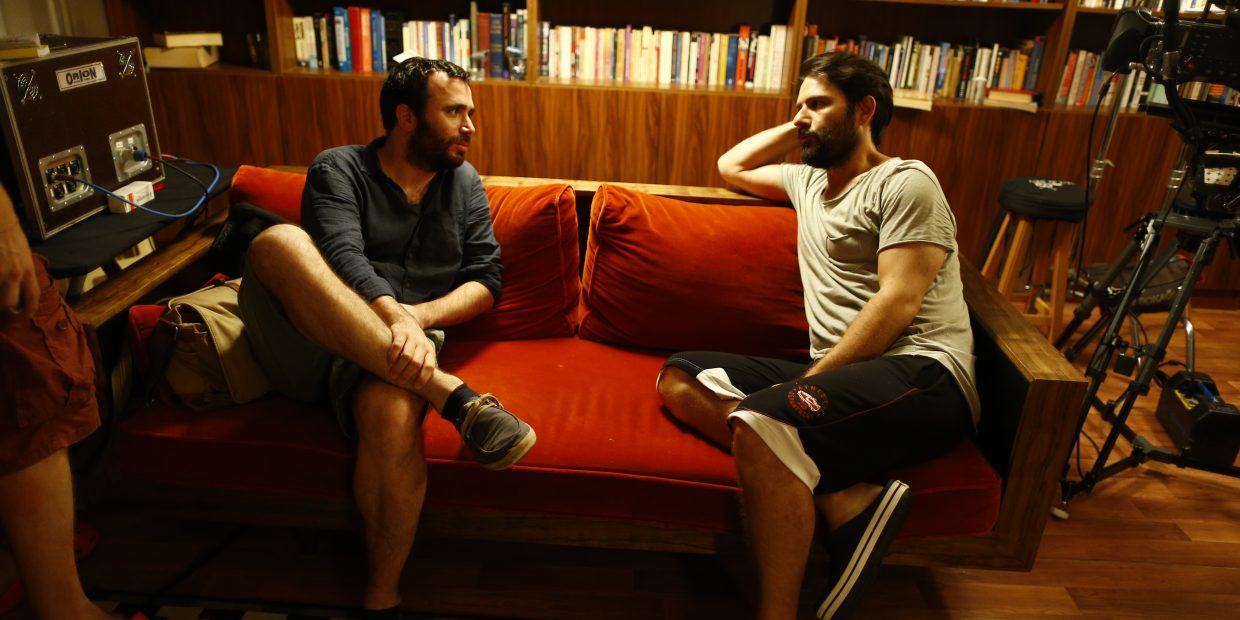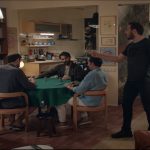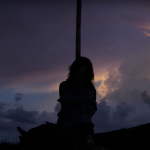Set during Turkey’s Taksim Square anti-government protests in 2013, Michael Onder tackles themes of political difference and morality in his comedy and debut film Taksim Hold’em. By choosing to set the story in an apartment during a poker game, rather than in the streets along with the protesters, the film focuses on capturing the interpersonal drama and moral discussions of characters with differing values.
Speaking with FilmDoo, Onder expresses that many of his stylistic and narrative choices are connected to the film’s main themes, and how he hopes the film will create a more open and fruitful dialogue about political difference.
Why did you choose to structure the story around a poker game?
I was interested in poker before this story. I observed a close friend of mine, and his journey through games and tournaments, and I was fascinated by the thought processes that take place during the game. There is so much drama in such a static environment—strategies, deceit, winning and losing. With the idea of people stuck in a flat during a time of protests, poker was the best activity that can take place in order to explore the themes as well as create interesting conflicts.
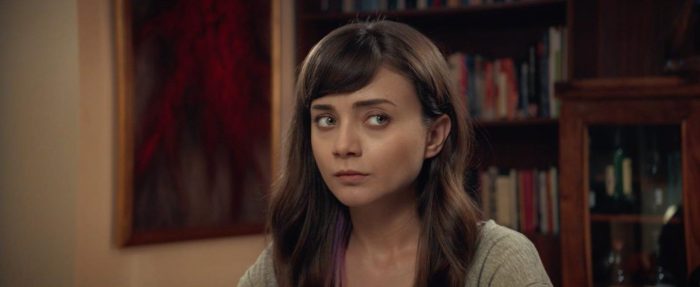
strategies, deceit, winning and losing.”
The first reason is that the perception of poker contrasted to the perception of protests happening outside. The protests are a noble social movement, whereas poker is at the individual end of the spectrum. In Turkey, although it is popular in certain social circles it is mostly seen in a negative light. It is considered gambling, the opposite end of the spectrum of being noble. It is individualistic and predatory. Everyone is out for themselves. This too contrasts with people in the protests who are willing to take risks for the common good. Alper is constantly criticized by others for being selfish, he just wants to not get involved with anything, which he believes he has a right to. However, the fact that he is so eager to play poker doesn’t help his case at all.
Although the image of poker may be gambling, if the players are good then it is a battle of wits. A part of the game is calculating the risk and the probability of winning, and Alper is such a player. He calculates everything at the table. This is also how he approaches the problems in the real world. All this thinking prevents him from acting, whereas some of the others don’t think too much and just act. This might be a disadvantage in poker, but can be an advantage in real life. We see how these approaches differ from how the characters approach main themes of the film. So just as in the game, people’s world views are also battling to win.
One of the themes of the film is how people believe are perceived by others. However, this image of themselves is generally undermined by how they act. Some are aware of this, and some are not. This is mirrored in poker. There are varying levels of poker players. The first level are those that only think of their own cards without considering others. Second level players try to figure out what the other players are holding. The third level player, being aware that others are trying to figure out his or her card is, will try to manipulate the perception of the other players. Each character is at a certain level, and this is also how successful they are at creating an image to others. However, as in the poker, everyone finds out what you really hold at the showdown.
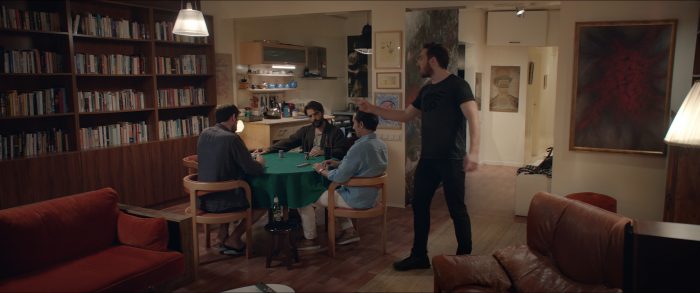
The film revolves around various characters with different values and reactions to the political situation. Were any of these characters or their interactions based on your personal experiences?
I have used personal experiences and borrowed certain elements from my friends, but the situation and the characters are mainly there to dramatize the central theme. There are certain quirks I borrowed from some of my friends, which help to anchor the character in the physical world. This anchoring is especially useful in the early days of the writing process, where the characters are not fully fleshed out.
In every character there is a part of me as well; my thought, fears, shortcomings. In reality people have a lot of conflicting personality traits. When writing my characters I try to recreate that. A lot of their goals and desires conflict with one and another.
I try to make sure that each character has a consistent and coherent worldview. Their arguments should be sound and valid for the debate being entertained. I try to find the situations where there is not one right answer. Once I know the character and they start having lives of their own, I try to eliminate my own opinions from the script (as much as possible). Mine seem very predictable and colourless compared to what they can come up with. I want the characters to defend their views until the bitter end; I have never heard someone change their opinion at a dinner party just because they heard a better alternative.
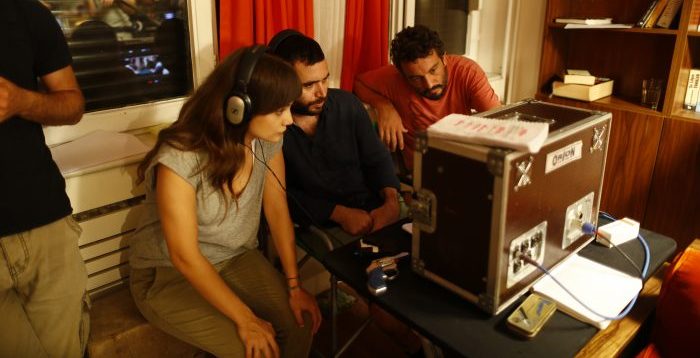
Another element of structure is how the personal everyday problems mirror the political debate. When discussing politics, the characters present themselves as holding particular ideals, when it comes to acting, they don’t stick to them. The current political climate is very coded and everyone feels very strongly about what is right and what is wrong. I wanted to recreate the principles of the political debates in seemingly irrelevant everyday problems so we can observe how the characters really behave in these situations. It allows the theoretical discussions to be practically tested out. Not surprisingly, most characters fall short of their own ideals, as we would in real life.
The only character that tries to be true to himself is shunned from the group because he doesn’t share their views. In polarised societies, group pressure intensifies even if these people believe themselves to be open minded. They demand constant allegiance to the group.
I found it intriguing that the film has very little background music or extra-diegetic sound, can you tell me a little about this stylistic choice?
This choice is because this story is about the main character’s attempt to ignore the world outside and live in his own comfortable bubble. The sound is the reminder of the world outside. The sound is the shadow that is looming over his poker game. Our sound designer Umut Şenyol turned that world into a character that is very consistent. We talked about how that character moves, and what its story is. When it reaches a crescendo, the bubble cracks and the world seeps in, then we are no longer focused on the sound from the outside, because the threat is now inside. The sound-scape allows the audience to experience the film from Alper’s point of view. When he is focused on the game, the external noises die down. When the protests are a threat to his game, it invades the living room.
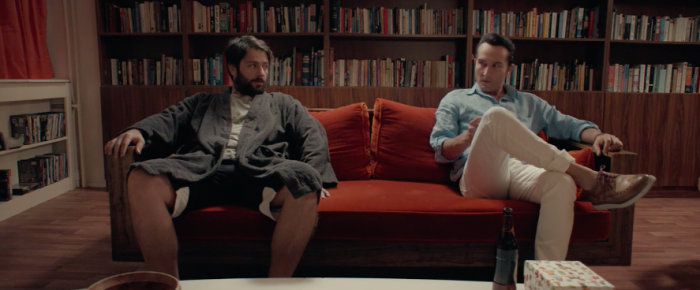
Because this movie is just people talking in a room, I was worried that it could get dull quite quickly, so I wanted the dialogue be as fast as it can be without it feeling unrealistic. The audience intuitively knows where you are heading way before the characters have said a word. In order to keep control of their attention I want the dialogue to be racing, so the viewer feels like they need to catch up. How much pause was acceptable in-between lines was something we constantly discussed with my editor Taner Sarf. Eventually, with fast editing and that much dialogue it felt that adding music would make the sound too crowded, and the film could lose its focus. Which was a shame because my brother, Steady Fingers, is a musician and had composed beautiful pieces for the film, but I was only able to use two of them.
Almost the entire film is set in one space, in Alper and Dafne’s apartment. In contrast with the dark streets outside, the color scheme and furnishing in the apartment really stood out to me. Was there any specific message or aesthetic you hoped to express through these choices?
The house was crucial to convey the world of Alper. We needed to understand who he is. The colour palette was chosen first of all to contrast the cold, blue-ish exterior. The house is warm and inviting, with yellows, oranges and red. The audience should empathise with Alper’s desire not to leave the house. We peppered the house with details that would not only show his character, but also help particular conflicts within the house. The location itself had bright white walls and floors and very little furniture. We chose every single prop that went into it, from the paintings to the bookshelves. Alper’s backstory and his history with Defne are in that room. I hope all the details made the house feel lived-in. The best compliment we had about the production design was when someone told me I was lucky to find such a house, they had thought that it was genuinely someone’s apartment.
Check out the painting that we hung behind Alper, which I requested from Ilknur Coşkuntuna, the wife of our production designer. She also did our poster alongside certain illustrations. The whole premise and theme was condensed into that little frame.
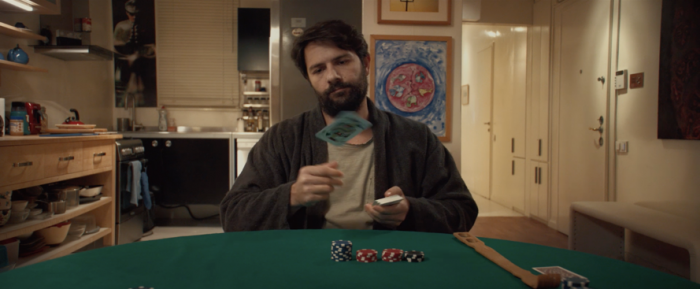
One of the references I used to describe the story before we started filming was Edgar Allan Poe’s “The Masque of the Red Death”. A group of aristocrats lock themselves in a castle and entertain themselves with costume parties, when outside people are dying from Red plague. So when I was working with our production designer Tolga Coşkuntuna, we decided to use red for certain backgrounds. Red reminded us of the violence that was trying to be ignored outside as well as a little nod to the Poe.
Who is the intended audience for this film, and what message do you hope it gives them?
‘Message’ is a strong word. I try to ask questions that genuinely trouble me and that I have no answers to. I believe these questions apply to a much wider demographic than the group portrayed in the film, both in Turkey and abroad. Obviously I can’t predict how it will be interpreted, so we’ll see. I hope the audiences will find the questions interesting as well as finding the film entertaining.
In polarised societies, fruitful dialogue is no longer possible. Right or wrong depends on who says it. This is the enemy of free thought. Narratives describing social events become divisive. In groups, pressure becomes as suffocating as the pressure of the “other”. Debates are reduced to picking a team. Everyone claims their views are absolute truths. So being self-critical is rare, as it is seen as a betrayal to the group. With this film, I wanted to be self-critical with the hope that it might allow room for debate. I am not sure if this can be achieved at all, but I thought it was worth a shot.
Do you have any projects that you’re currently working on?
I am currently working on a play.

